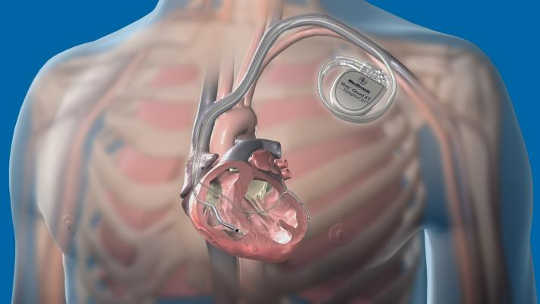
A system of sensors added to defibrillator implants might make it possible to predict heart failure events—sometimes more than a month before they happen.
Researchers tested the concept with 900 heart failure patients for one year. They uploaded software to each patient’s implanted defibrillator, a battery-powered device that delivers an electric shock if the patient’s heart stops beating.
The suite of sensors detected 70 percent of heart failure events in patients.
The software allowed the defibrillators to monitor the patients’ heart rate, activity, breathing, heart sounds, and electrical activity in the chest.
Over the study period, the suite of sensors detected 70 percent of heart failure events in patients. This detection was often more than a month before the events occurred. Sensitivity at this level far exceeded the researchers’ goal of greater than 40 percent detection. While there were false positives, the number was within an acceptable range.
“If you’re going to monitor a hundred patients, it becomes a fairly manageable number of alerts that you have to deal with,” says John Boehmer, a cardiologist and a professor of medicine at Penn State College of Medicine.
Boston Scientific developed the system—which they named HeartLogic—and funded the study.
Monitor and prevent
“This is a new and clinically valuable measure of worsening heart failure, and it combines a number of measures of the physiology and heart failure, much like a doctor will look at a patient,” Boehmer says. “Doctors look at all their signs and symptoms, get some tests, and put it all together and make a decision about how well or ill the patient is. HeartLogic does it similarly.
“It integrates a number of measurements of what’s going on with the patient, including breathing, activity, and heart sounds, and puts that all together to give us an index that we believe is both sensitive and specific for heart failure.”
In this way, Boehmer says, the technology can help monitor the patient’s condition so heart failure events can be prevented before they happen.
“It’s like having high blood sugar, if you’re managing diabetes,” Boehmer explains. “The doctor doesn’t need to know about every high blood sugar and every high blood sugar doesn’t result in a hospitalization.
“But you want to treat it before it gets very high and the patient becomes so symptomatic they become ill and end up in the hospital. This is the same concept.”
Boehmer presented the findings at the recent American Heart Association annual meeting in New Orleans. Researchers are planning a pilot study and intervention trials to test the system’s safety, physician acceptance and use, and patient outcomes.
Source: Penn State
Related Books:
at InnerSelf Market and Amazon

























